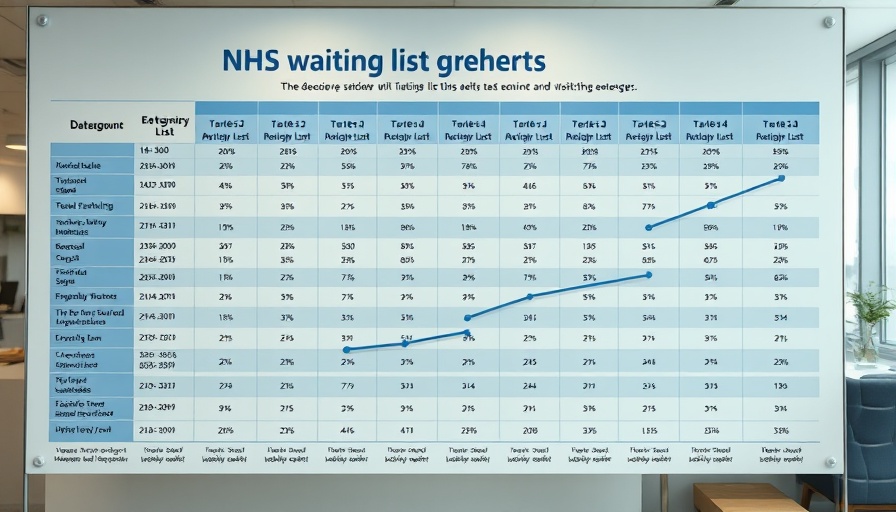
The NHS Takes Aim at Health Inequalities with New Data
The National Health Service (NHS) has made a groundbreaking move by publishing detailed breakdowns of patient waiting lists, aimed at combating health inequalities affecting working-class and minority groups. For the first time, data reveals that individuals from deprived communities, particularly those of Asian or Asian British backgrounds, are often left waiting longer for elective surgeries than other demographics.
Understanding the Impact of Socioeconomic Status on Healthcare
This new revelation is particularly alarming as it underscores a correlation between socioeconomic status and health outcomes. Patients from lower-income areas tend to face systemic barriers that result in longer wait times for necessary medical procedures. According to NHS data, more than half of those on waiting lists fall within the working-age group (19-64 years), with significant portions awaiting surgeries for gynaecology and ophthalmology – specialties that are typically more urgent for these demographics.
How the NHS Plans to Use This Data
The NHS's latest release aims to create a more transparent health system, allowing local services to pinpoint and address disparities in patient care effectively. With detailed waiting list statistics broken down by factors like age, sex, ethnicity, and overall deprivation levels, healthcare professionals can better implement strategies that tackle these injustices.
Stella Vig, the NHS National Clinical Director for Elective Care, emphasized that understanding these demographics is vital. She stated, "By knowing who our patients are, we can better analyze waiting times, engage with communities, and implement targeted interventions to reduce these time disparities. This initiative is not just about numbers; it’s about improving lives.”
Community Health Initiatives Making a Difference
The NHS also recognizes that addressing health inequalities goes beyond simply reducing wait times. Significant investment is being directed towards community health initiatives, including the rollout of neighborhood health centers that cater specifically to those in poorer areas. By prioritizing locations with the lowest life expectancies, the NHS aims to not only reduce waiting times but also improve overall community health outcomes.
Future Predictions: Building a Healthier Workforce
One of the most promising aspects of the NHS's efforts is the focus on economic inactivity. Specialized teams are being deployed to communities desperately affected by unemployment and long waiting lists, promoting better access to treatment and health education. This approach will ensure that individuals not only receive medical care promptly but are also empowered to achieve better overall health, contributing to a healthier workforce.
Policy Changes and Increased Funding
The NHS's 10 Year Health Plan is central to these reforms, ensuring that funds are allocated to those communities that need it most. With millions earmarked for initiatives targeting health inequalities, patients from working-class areas can expect better, faster access to care. This initiative includes a £5 million investment to recruit 1,000 employment advisers within the NHS, facilitating job placements for those seeking careers in health care.
Taking Steps Towards Integrated Care
The NHS plan outlines an integrated care approach that not only addresses immediate healthcare needs but also considers broader socioeconomic factors affecting health. By creating partnerships between various health and social service agencies, the NHS seeks to develop a holistic health strategy that considers all aspects of a patient's life.
This proactive stance is essential in reducing the costs associated with long-term sickness, which are estimated to be as high as £330 billion for the UK economy. By investing in preventative care and health education, the NHS hopes to alleviate many of the burdens that impact economic productivity.
Join the Movement: Health Matters for All
As these groundbreaking changes take place, it’s crucial for individuals to stay informed and engaged with local health initiatives. Community health checks and wellness screenings are vital components in this ongoing effort to combat health inequalities. For those in Muskegon looking for accessible healthcare options, consider reaching out to local providers for wellness evaluations and annual health check-ins.
By actively participating in these health programs, you can contribute to a healthier community and advocate for systemic changes that ensure equitable healthcare for all.
Contact Terrijo Parker at 231-571-6100 to unravel the complicated and make it understandable, for your best benefits you deserve.
 Add Row
Add Row  Add
Add 




Write A Comment